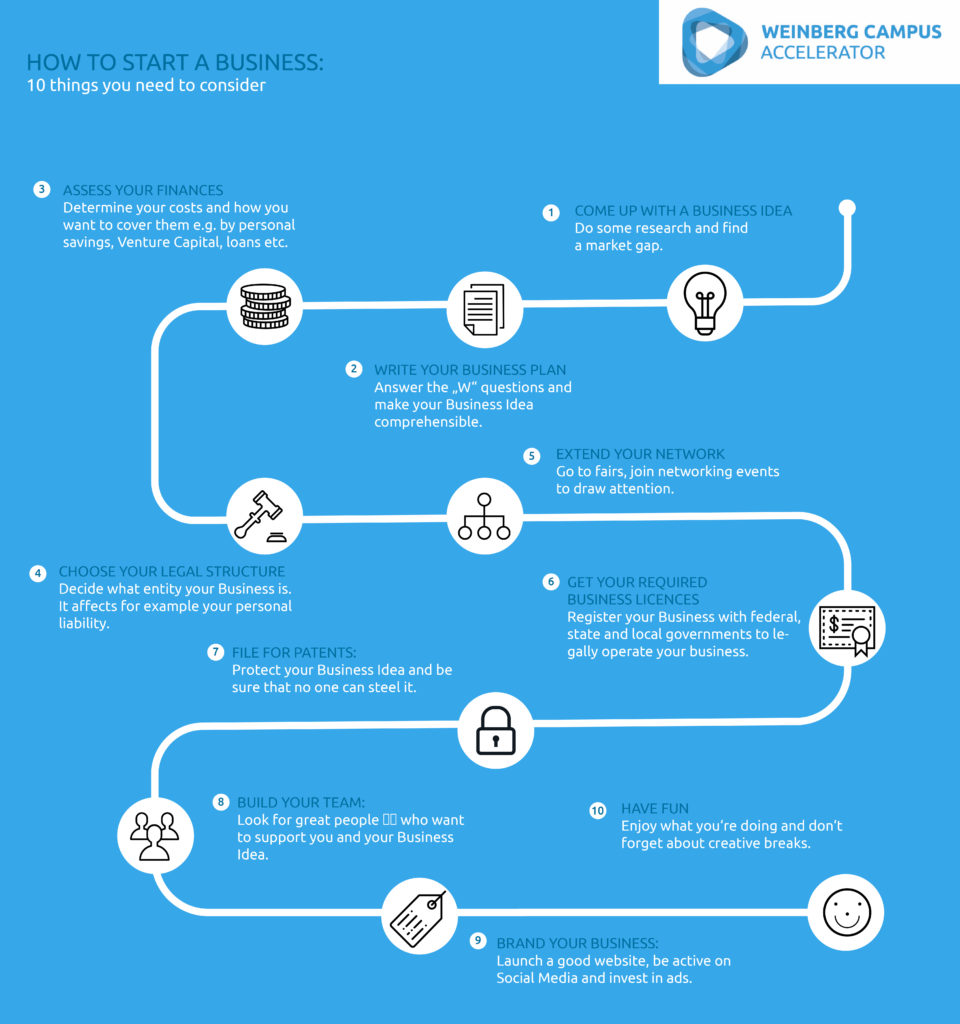Starting a Business is not an easy undertaking…especially when you have zero experience. Therefore, we made a list of things you need to do to found your own company. So read further and maybe you can already check off some tasks.

Checklist to start your own business
1. Business Idea
First and foremost you need to come up with a good business idea. Otherwise there is no sense to enter the market with something no one needs. So do some research, brainstorm, and let your imagination flow. Find out what people are still missing in their lives. A good way is to talk to friends and family to find out about their consumption habits. You should definitely be up to date regarding trends and also have the big picture in mind: have a look at what is trending in other countries or where people detected a problem. That is your chance to step in and find a solution for that. Congratulations your business idea has arosen.

2. Business Plan
A bulletproof Business Plan is vital: there is no way around it. There is no rule of which content it should exactly cover. It also depends on your business. However, the following should defenitely appear in your Business Plan:
- Executive Summary
- Businss Description & Structure
- Market Research & Strategies
- Management & Personnel
- Financial Plan
3. Finances
Have you thought about how you want to finance your business? Do you have enough private capital or have you looked into other options? One possibility could be to get a loan from a bank or to find someone who is interested to invest in your company and to give equitiy in your business in return. If that doesn’t sound right to you and you want to keep the business in your hands crowdfunding could be a suitable alternative. Another great way to cover your costs is to apply for public funds. There are a lot of programs that are specialized in bringing entrepreneurship forward. So do some research, there might be the perfect program for you.

4. Legal Structure
The decision which legal structure you want to choose is not an easy one but a necessary part of running a business. It, however, determines what kind of formalities and paperwork you have to deal with. That is why it is important to understand the options. The most common types of business entities are the following:
- Sole proprietorships
- Partnerships
- Limited Liability Companies
- Corporations
- Cooperatives
A good start is also to open a business bank account as it is also mandatory for some legal structures.
5. Network
Once you are clear about your finances and legal structure it is time to mingle and put your feelers out. A good business idea only will not make any difference. A supportive network of people pushing you to the next level, introducing you to other important players that may be beneficial along your journey is key here. So go to networking events, spread the word about your business, meet other enrepreneuers, exchange experiences, successes and mistakes…and learn from others. Thus, it can prevent you from doing the same errors.

6. Business Licences
Before you can legally operate your business you have to put Business Licences and Permits on the agenda. The most common licence is the general business licence. However, it depends on your company type and industry which business licence you might need. A good way to start this process is to contact the Secretary of State office of your state and your local municipality. They can give you lots of information and advice.
7. Intellectual Property
“IP” stands for Intellectual Property which protects creations of the human intellect like software, know-how, inventions etc. Any startup should think about an IP strategy to safeguard their work. So that competitors cannot copy their service or product or even parts of it. There are many types of intellectual property rights like patents, copyrights, trademarks and trade secrets. Choosing when to start a patent process is a very critical decision for startups. You don’t want to wait too long risking your patent right might be forfeited but you also don’t want to rush things and spending a high amount of capital when your business is not ready yet.
However, many startups don’t know about the strict deadlines in patent law of filing a patent. Most countries follow the “first to file” instead of “first to invent” rule. Which means that they won’t allow a patent protection of products or services if you have demonstrated your business idea to the public already before applying for a patent. This is a note to yourself that “IP” will require lots of decision-making.

8. Team
Thumbs up, you have found your business idea. However, this is only one piece of the puzzle. One thing is clear you cannot do the work all by yourself: So look for great team members that can join your business and together with you bring your startup forward.
9. Brand Building
Great, you have put your team together. But there is nothing much to do if no one knows about your business. Thus, Brand Building and Brand Managament is the key here. What is your company logo? Do you have a website already? Are there any other channels you want to be present and active on Social Media? What’s the positioning of your business? Have you thought about your USP (Unique Selling Proposition)? Well, think about these questions and come up with a thought-out marketing campaign that also states how, where, for how long and for which budget you want to advertise your company. These measures are significant to make people aware of your offering and to build your brand. Maybe you also want to consider a specific company culture with values that you can transmit internally and externally. Nothing has a better effect than working toward a greater purpose people can identify with.

10. Have fun!
Last but not least and probably the most important aspect: Enjoy what you’re doing and have fun! Nothing is worse than being unhappy or suffering at work. So create a nice work atmosphere, set tasks for the week with deadlines but also schedule enough breaks. These are the sources for new inspiration and creativity.
Join us
Are you a founder yourself and need help bringing your startup forward? Then find out more about our Accelerator Program here!

Author: Kathleen Bier
Online Marketing & Project Management




